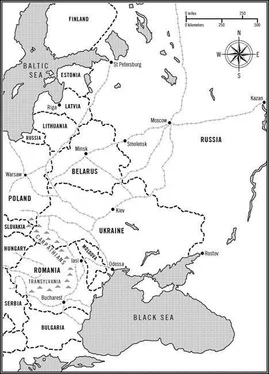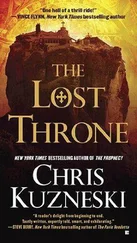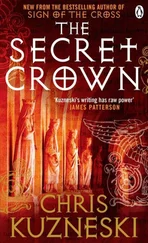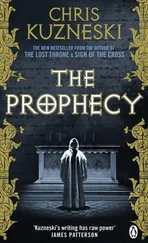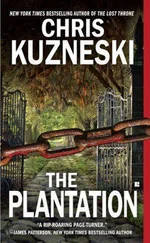Chris Kuzneski - The Hunters
Здесь есть возможность читать онлайн «Chris Kuzneski - The Hunters» весь текст электронной книги совершенно бесплатно (целиком полную версию без сокращений). В некоторых случаях можно слушать аудио, скачать через торрент в формате fb2 и присутствует краткое содержание. Жанр: Криминальный детектив, на английском языке. Описание произведения, (предисловие) а так же отзывы посетителей доступны на портале библиотеки ЛибКат.
- Название:The Hunters
- Автор:
- Жанр:
- Год:неизвестен
- ISBN:нет данных
- Рейтинг книги:5 / 5. Голосов: 1
-
Избранное:Добавить в избранное
- Отзывы:
-
Ваша оценка:
- 100
- 1
- 2
- 3
- 4
- 5
The Hunters: краткое содержание, описание и аннотация
Предлагаем к чтению аннотацию, описание, краткое содержание или предисловие (зависит от того, что написал сам автор книги «The Hunters»). Если вы не нашли необходимую информацию о книге — напишите в комментариях, мы постараемся отыскать её.
The Hunters — читать онлайн бесплатно полную книгу (весь текст) целиком
Ниже представлен текст книги, разбитый по страницам. Система сохранения места последней прочитанной страницы, позволяет с удобством читать онлайн бесплатно книгу «The Hunters», без необходимости каждый раз заново искать на чём Вы остановились. Поставьте закладку, и сможете в любой момент перейти на страницу, на которой закончили чтение.
Интервал:
Закладка:
‘Is that all?’ Garcia joked.
‘For now,’ Cobb said.
‘You can do that before dessert,’ Papineau remarked.
‘We should make him do it for dessert,’ McNutt suggested.
Cobb looked at Jasmine. She was the team member he knew the least about. ‘Quick question: if I were to punch you in the face, what would you do?’
She shrugged. ‘Probably cry.’
He laughed. ‘That’s what I figured. There’s no doubting your skills as a historian — you’ve just demonstrated them. But I need to be sure that you can take care of yourself in the field. Starting early tomorrow morning, I want you to learn the rudiments of self-defense. Preferably judo or jiu-jitsu.’
‘Why Japanese?’ she asked.
Cobb smiled. ‘Good question. Those styles are directed outward, designed to use an opponent’s attack against him. The Chinese forms use inner strength and four-point movement from center. They take longer to master.’
‘I understand,’ she said. ‘I’ll find a good school.’
‘No, find a good sensei for private lessons,’ Cobb said. ‘Eight hours a day. You won’t have a lot of time. Don’t worry: once you start, it’ll become addictive. And Hector?’ He turned back toward Garcia. ‘When you have the information I asked for, join her. That would make it after breakfast tomorrow, I’m guessing.’
‘I’m kind of a klutz,’ Garcia said.
Cobb glared at him. ‘Hector, that was our short discussion. You’re taking lessons.’
Garcia’s mouth didn’t move, but his eyes said, Yes sir!
‘Hey, chief!’ McNutt called as he headed upstairs. ‘We’ve got our marching orders. What are you going to be doing?’
‘Me?’ Cobb said. ‘I’m going on a rekky of Eastern Europe.’
19
Three weeks later
Friday, September 14
Moscow, Russia
Andrei Dobrev roamed the reception, looking for someone to talk to, but his presence was mostly ignored by the well-dressed guests. There was a fake smile or two, and a few polite nods, but other than that, a lot of blank stares — especially when they learned that he was a semi-retired member of the working class, and not a dignitary or a well-connected politician.
But Dobrev didn’t take it personally.
At his advanced age, he was used to being ignored.
The only reason Dobrev had been invited to the Leningradsky Rail Terminal for the announcement of the new American-European train survey was because of his long career as a railway worker. He was nothing more than a token laborer to put a blue-collar spin on the proceedings. Having worked on thousands of miles of track and at various stations throughout Russia, Dobrev knew more about the railways than most of its executive officers.
When it came to trains, he was a walking encyclopedia.
His was a proud railroad family, dating back more than a hundred years. His grandfather, Bela, worked all the way through the mobilization and nationalizing of the system through World War I and the Revolution. His father, Cristian — who married a Russian woman and moved to Moscow from Romania — worked the lines at the height of the railroad industry’s golden age. And he, Andrei, had survived the screeching, convulsive collapse of the Soviet Union and the rise of the new Russian railway. Foreign investors had made financial and engineering contributions, but it was still a Russian line, sprawling through some of the most hostile rail territories on earth. It was the lifeline of towns and villages that could not be reached by any other means.
Two months earlier, after forty years of honorable service, Dobrev had lightened his load by becoming an advisor. He had surrendered his day-to-day activities with regret. Those first few days when he did not put on his coarse, bull-hide work gloves, he had felt worse than naked; he felt useless. But it was good not to be hurrying from one station or another, to one crisis or another, to one bar or another to find a local railway authority. His reassignment had been mandated by the implementation of Government Order #384:
When a member of the track workforce shall reach a certain age, that age being sixty-five …
But Dobrev was occasionally invited to major railway events, a proud example of Russian industry and dedication. And he never failed to feel an overwhelming rush of pride whenever he stepped into any station in Russia — particularly in Moscow, the shining city which the last three generations of Dobrevs had helped to connect to the rest of the continent.
The Leningradsky terminal was a particular favorite. It was the creation of the great Konstantin Andreyevich Thon, Imperial Russia’s official architect, who also designed the Grand Kremlin. This square, spired, palatial place was created in the great architect’s later years, but it still served as something of a revolution. Completed in 1851, it combined the best of old and new by rejecting Roman neoclassicism in favor of what became known as the Russian Revival style, identified by cunning and clever steel work, which was then one of the newest construction techniques.
Dobrev drank in the rail terminal’s handsome exterior as he looked around at the small crowd. This party — announcing and celebrating a new rail survey that would improve track conditions in rural regions — was suitably austere and ostentatious. They had cordoned off a corner just inside the main entrance so passengers could flow by with a minimum of inconvenience to them. Dobrev noticed that the rush and bustle of commuters, crowded but never congested, would be visible to the foreign guests.
The organizers had set up a cocktail bar and several tables of caviar, buckwheat blinis, pelmenis, and pierogis in a cordoned section off to the right of the main entrance, with enough security guards to discourage the gypsies and mafia wannabes who always hovered nearby anything of significance in Moscow. Dobrev studied the crowd: minor dignitaries, lesser committee members, petty trade representatives, and unimportant railway officials.
Obviously they wanted to put on a low-level, dog-and-pony show for the ‘Amerikos’. That was how Russians termed ugly Americans, men and women who came with money and opinions but very little experience. Sometimes, no experience at all. Therefore, the total absence of Russian, state-run media wasn’t much of a surprise. The only other guest who stood out was the thin, bald man in a black tunic, pants, boots, and coat. Dobrev felt a chill, remembering the black, ripstop uniforms of the Russian OMON — a special-purpose mobile unit deployed during violent situations, including some Dobrev wished he could forget.
But it was more than his outfit that set this man apart. The bald figure in black had beady, attentive eyes, giving the impression that he was half security officer, half vulture. Just as Dobrev was heir to a great railroad tradition, this man was a throwback to Okhrana, the secret police of the Romanov dynasty. Not only did he observe, he judged with his gaze.
A minute later, Dobrev’s attention was drawn to the team of surveyors who entered the side door to polite applause. They were led by the study sponsor, Jean-Marc Papineau, who waved to the crowd like a visiting king. While most of the male guests gawked at the blue-eyed blonde in the form-hugging black dress and heels who was standing beside Papineau, Dobrev focused on the Asian woman in the pencil-skirt suit and bone-colored, high-necked blouse. He knew she would be treated poorly because she was different than him and his comrades.
Sadly, that mattered to Russians who were Russian to the core.
But Dobrev wasn’t like that. He didn’t care about race, or age, or anything superficial. He only cared about the person inside. Intrigued by her presence, he took it upon himself to watch over her at the reception, like a parent keeping an eye on his child at the playground. He gave her plenty of distance, but was ready to spring into action if he deemed it necessary.
Читать дальшеИнтервал:
Закладка:
Похожие книги на «The Hunters»
Представляем Вашему вниманию похожие книги на «The Hunters» списком для выбора. Мы отобрали схожую по названию и смыслу литературу в надежде предоставить читателям больше вариантов отыскать новые, интересные, ещё непрочитанные произведения.
Обсуждение, отзывы о книге «The Hunters» и просто собственные мнения читателей. Оставьте ваши комментарии, напишите, что Вы думаете о произведении, его смысле или главных героях. Укажите что конкретно понравилось, а что нет, и почему Вы так считаете.
